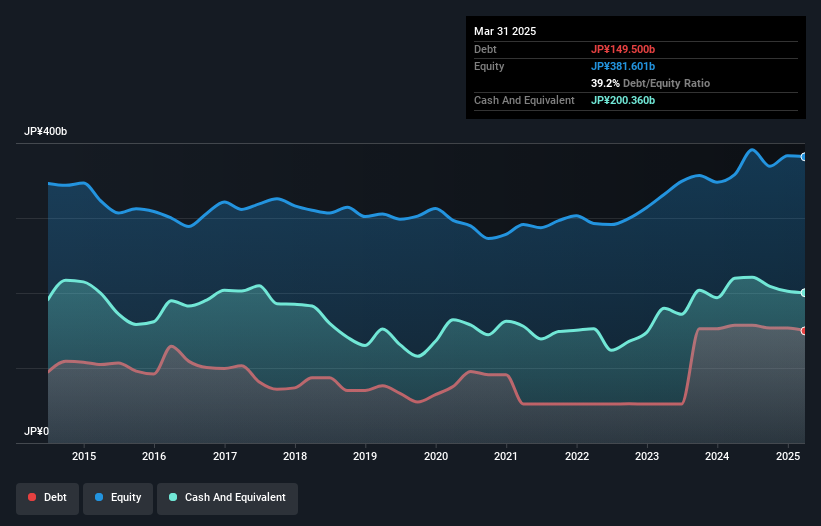Does Sega Sammy Holdings (TSE:6460) Have A Healthy Balance Sheet?
Some say volatility, rather than debt, is the best way to think about risk as an investor, but Warren Buffett famously said that 'Volatility is far from synonymous with risk.' It's only natural to consider a company's balance sheet when you examine how risky it is, since debt is often involved when a business collapses. Importantly, Sega Sammy Holdings Inc. (TSE:6460) does carry debt. But should shareholders be worried about its use of debt?
When Is Debt A Problem?
Debt is a tool to help businesses grow, but if a business is incapable of paying off its lenders, then it exists at their mercy. If things get really bad, the lenders can take control of the business. However, a more common (but still painful) scenario is that it has to raise new equity capital at a low price, thus permanently diluting shareholders. Of course, the upside of debt is that it often represents cheap capital, especially when it replaces dilution in a company with the ability to reinvest at high rates of return. The first step when considering a company's debt levels is to consider its cash and debt together.
What Is Sega Sammy Holdings's Net Debt?
You can click the graphic below for the historical numbers, but it shows that Sega Sammy Holdings had JP¥149.5b of debt in March 2025, down from JP¥157.0b, one year before. However, it does have JP¥200.4b in cash offsetting this, leading to net cash of JP¥50.9b.

How Healthy Is Sega Sammy Holdings' Balance Sheet?
According to the last reported balance sheet, Sega Sammy Holdings had liabilities of JP¥94.2b due within 12 months, and liabilities of JP¥169.0b due beyond 12 months. On the other hand, it had cash of JP¥200.4b and JP¥60.0b worth of receivables due within a year. So its total liabilities are just about perfectly matched by its shorter-term, liquid assets.
This state of affairs indicates that Sega Sammy Holdings' balance sheet looks quite solid, as its total liabilities are just about equal to its liquid assets. So while it's hard to imagine that the JP¥592.4b company is struggling for cash, we still think it's worth monitoring its balance sheet. Despite its noteworthy liabilities, Sega Sammy Holdings boasts net cash, so it's fair to say it does not have a heavy debt load!
See our latest analysis for Sega Sammy Holdings
But the bad news is that Sega Sammy Holdings has seen its EBIT plunge 15% in the last twelve months. We think hat kind of performance, if repeated frequently, could well lead to difficulties for the stock. When analysing debt levels, the balance sheet is the obvious place to start. But it is future earnings, more than anything, that will determine Sega Sammy Holdings's ability to maintain a healthy balance sheet going forward. So if you want to see what the professionals think, you might find this free report on analyst profit forecasts to be interesting.
Finally, while the tax-man may adore accounting profits, lenders only accept cold hard cash. While Sega Sammy Holdings has net cash on its balance sheet, it's still worth taking a look at its ability to convert earnings before interest and tax (EBIT) to free cash flow, to help us understand how quickly it is building (or eroding) that cash balance. Over the most recent three years, Sega Sammy Holdings recorded free cash flow worth 64% of its EBIT, which is around normal, given free cash flow excludes interest and tax. This cold hard cash means it can reduce its debt when it wants to.
Summing Up
While it is always sensible to look at a company's total liabilities, it is very reassuring that Sega Sammy Holdings has JP¥50.9b in net cash. So we don't have any problem with Sega Sammy Holdings's use of debt. When analysing debt levels, the balance sheet is the obvious place to start. But ultimately, every company can contain risks that exist outside of the balance sheet. Be aware that Sega Sammy Holdings is showing 1 warning sign in our investment analysis , you should know about...
At the end of the day, it's often better to focus on companies that are free from net debt. You can access our special list of such companies (all with a track record of profit growth). It's free.
New: Manage All Your Stock Portfolios in One Place
We've created the ultimate portfolio companion for stock investors, and it's free.
• Connect an unlimited number of Portfolios and see your total in one currency
• Be alerted to new Warning Signs or Risks via email or mobile
• Track the Fair Value of your stocks
Have feedback on this article? Concerned about the content? Get in touch with us directly. Alternatively, email editorial-team (at) simplywallst.com.
This article by Simply Wall St is general in nature. We provide commentary based on historical data and analyst forecasts only using an unbiased methodology and our articles are not intended to be financial advice. It does not constitute a recommendation to buy or sell any stock, and does not take account of your objectives, or your financial situation. We aim to bring you long-term focused analysis driven by fundamental data. Note that our analysis may not factor in the latest price-sensitive company announcements or qualitative material. Simply Wall St has no position in any stocks mentioned.
About TSE:6460
Sega Sammy Holdings
Through its subsidiaries, engages in the entertainment contents business.
Reasonable growth potential with adequate balance sheet.
Similar Companies
Market Insights
Community Narratives




